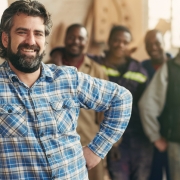Take a job and keep it as long as you can. If you lose it, don’t worry; the government will pay you welfare. When you get too old to work, they’ll extend that welfare in the form of Social Security. Whatever you do, you must consume, consume, consume, because that’s what makes the economic wheel go round. If you haven’t accumulated sufficient personal spending funds from your work, don’t worry. Get a mortgage, get a home equity loan, get a student loan, borrow on your credit card, get a new car with an auto loan, whatever it takes to keep consuming. Better do it now while you’re young.
That’s the message of Keynesian economics, when viewed through the lens of the individual. Keynes hated saving, and loved Government spending, and valued consumption above all else. He was, after all and by his own admission, an immoralist. Governments have seized on this immoralism to lock citizens into a narrative that discourages hard work and entrepreneurship and promotes government spending, welfare and dependency. After all, if you are too busy working and too assiduous in saving, you might not consume enough and you might escape from the consumption matrix.
Now, there is a significant group rejecting the conventional narrative, preferring a better life design: more saving, less consumption, more self-reliance and more control over one’s own life choices.
It’s a movement some have christened FIRE: financial independence, retire early.
The basic template emphasizes saving. FIRE proponents emphasize saving as much from their earnings as possible. They live simply. The aim is to get to retirement early, so that they are not spending their time between the ages of 40 and 70 chasing promotions and pay raises on the corporate treadmill while worrying about paying off their mortgage and credit card debts to big banks.
The movement is worldwide, with an array of podcasts, blogs, discussion forums, communities and clubs where practitioners share their experiences, tips and advice.
FIRE adherents are often millennials and younger members of Generation X who have college degrees, above-average incomes and the discipline to adopt a strict do-it-yourself approach to savings, investment and retirement. Some say they are saving as much as 75% of their income, 5X the rate conventional financial advisors often recommend.
They might live in smaller houses or apartments and drive older cars (or not drive cars at all, walking to work and to neighborhood shopping). They seek the control that comes with self-reliance, and insulation from the financial shocks that can buffet the unprepared and the overstretched. Some of them work in conventional offices, feeling insulated from the promotion rat race by their financial independence. Others are freelancers and contractors, maximizing their flexibility and taking income management into their own hands. Sylvia Hall, who was featured in a Wall Street Journal article, aims to reach the point where she can “start living life on my own terms”, by which she means not “having to go back to work”. Her solution: amass sufficient financial assets to live off the income they generate – what some people call “retirement”, but she calls financial independence. She’ll be young and highly active and versatile and free when she gets to that point, hopefully, she says, by age 40. She plans to travel the world via Airbnb’s and has calculated exactly the budget and income she needs.
The method: savings. Ms Hall saves around 70% of her after-tax income. It’s a mindset, revolving around what’s important to her. Savings – the mean to the end of financial independence – is more important than the short term pleasures of consumption. She finds ways to economize on – i.e. make calculated economic decisions about – grocery spending, energy spending, entertainment spending and many other budget items. That doesn’t necessarily mean sacrifice; for example, she borrows friends’ Netflix passwords when they are not using the service. She puts the sharing revolution into action. And she has her time preference well ordered: save and invest now to live independently and happily in the future, when she’ll still be young.
Googling “financial independence, retire early” yields a rich trove of websites, blogs, videos, reddit posts, advice columns, investment advice, and examples and case studies. It’s not just in crazy corners of the internet. It’s been reported in Forbes and the New York Times as well as the Wall Street Journal. There’s a thriving and growing community of FIRE adherents, suggesting that it might represent a movement that repudiates the conventional narrative. This is the exciting news about FIRE. It’s a complete rejection of the conventional thinking of striving to hold on to a job all of the best years of one’s life by subjugating one’s aims to those of an employer, in order to briefly escape into late-life inactivity. The alternate choice is self-reliance, self-control and living life – all of it – on one’s own terms. The vehicle is savings.
Are these FIRE’d up savers detracting from economic growth? Quite the opposite. Saving, not spending, is the engine of economic growth. Frank Shostak at mises.org tells us:
Since saving enables the production of capital goods, saving is obviously at the heart of the economic growth that raises people’s living standards. On this Mises wrote, “Saving and the resulting accumulation of capital goods are at the beginning of every attempt to improve the material condition of man; they are the foundation of human civilization.”
Thus, the saving of money by one individual supports the production of another individual, who in turn, by exchanging his produce for money, supports a third individual.
The FIRE savers have a better understanding of economics than the Ph.D.’s at the Federal Reserve, the Treasury Department and MIT. The goal of individual economics is happiness, which can be defined – economically speaking – as selecting your own ends based on your own individual values and choosing the right means to achieve them. FIRE savers aim at a sense of control and independence, and have chosen savings as the means. They eliminate a lot of the negative sentiments that come with uncertainty and disappointment from their lives, and they feel good about their life management style today and their prospects for living life on their own terms tomorrow. Ph.D. not required.













